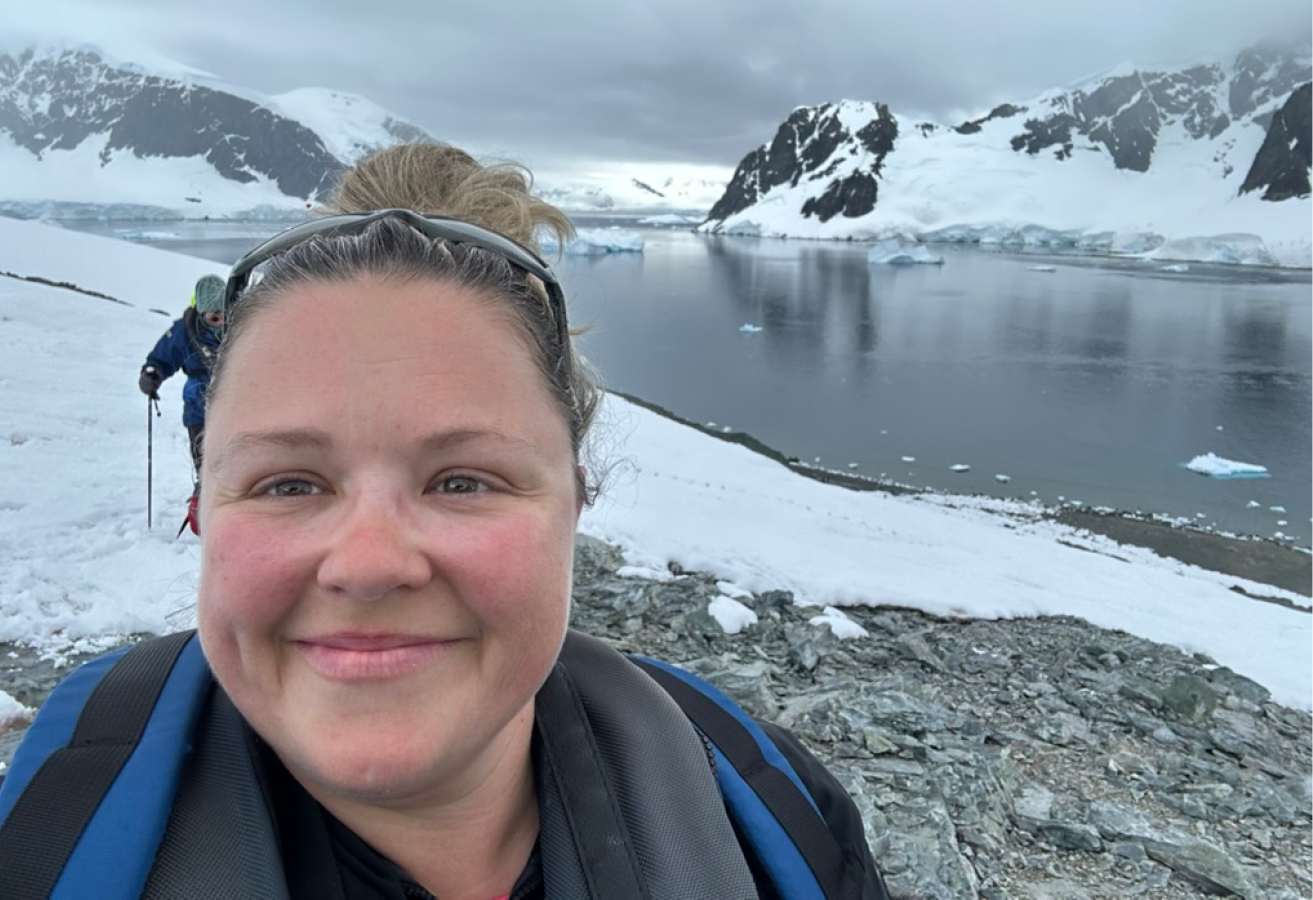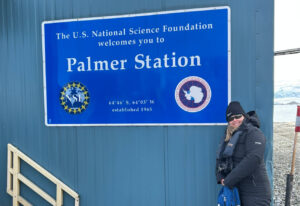Breaking ice and barriers: Shannon Kenrick-Rochon joins final Antarctic leadership expedition
Posted on July 11, 2025
As an Assistant Professor committed to equity and inclusion in STEMM, Shannon Kenrick-Rochon brings both academic expertise and personal passion to her role at NOSM University. Her selection for the final Antarctic expedition of the global leadership initiative Homeward Bound is a testament to her individual accomplishments and the values of the University—supporting women and non-binary leaders in science, technology, engineering, mathematics, and medicine.
Despite increasing dialogue and sector-wide efforts to provide equitable opportunities to women and non-binary people, systemic change in STEMM disciplines has been slow to start—women and non-binary individuals continue to be underrepresented in the field, especially in positions of leadership. That is why in 2015, leadership activist Fabian Dattner, along with Antarctic conservation biologist Dr. Justine Shaw, Antarctic Marine Biologist Professor Mary-Anne Lea, and Antarctic Marine Scientist Jess-Melbourne Thomas, set out to create Homeward Bound: an organization with the focus of creating leadership, networking, and development opportunities for women and non-binary people with STEMM backgrounds. They have been organizing Antarctic Expeditions since 2016, providing ten cohorts the opportunity to partake in their transformational leadership program.
Bringing together 100 women in STEMM from across the world, Shannon was encouraged by local expedition alumnae to apply to Homeward Bound. After sending off her application, Shannon put it out of her mind. Months later an unexpected email let her know that she had been accepted into the year-long leadership and theory program. When it was confirmed that Shannon would also be part of the Antarctic voyage, it brought a whole new level of anticipation and gratitude.
“It honestly didn’t feel real until I was boarding the plane after a year of planning to make it happen,” says Shannon.
 The voyage itself was an unforgettable experience—a combination of challenge and wonder. From crossing the Drake Passage, to visiting the Palmer Science Station, to daily landings surrounded by Antarctic wildlife, Shannon says it was like stepping into a nature documentary. “And yes, we even did a polar plunge,” she shared. “Nothing quite bonds a group of women like jumping into icy Antarctic waters together—it was cold, ridiculous, and absolutely unforgettable.”
The voyage itself was an unforgettable experience—a combination of challenge and wonder. From crossing the Drake Passage, to visiting the Palmer Science Station, to daily landings surrounded by Antarctic wildlife, Shannon says it was like stepping into a nature documentary. “And yes, we even did a polar plunge,” she shared. “Nothing quite bonds a group of women like jumping into icy Antarctic waters together—it was cold, ridiculous, and absolutely unforgettable.”
Among the many lessons the expedition brought, the most profound for Shannon was the importance of being fully present, “with no distractions, and surrounded by awe-inspiring beauty, I was reminded of just how short life really is.”
The experience has also given Shannon a deeper understanding of the challenges facing women globally, as she heard firsthand the different obstacles that those in her cohort experienced coming from different parts of the world, underscoring how we must go beyond encouraging women to dream, we also have a duty to protect the right for women to try—and to fail.
“If you’re not failing sometimes, you’re probably not pushing hard enough. The real loss isn’t getting it wrong—it’s in never having the chance to try.”
It’s lessons such as this that Shannon says now fuels her continued commitment to empowering women and girls through both her practice, and in her personal life. An advocate for sport and physical activity, Shannon intends to use what she learned during her time at Homeward Bound to empower young women to participate in sports, not just to build physical health, but to build confidence, leadership skills, and resilience. “Healthy women build healthy communities,” Shannon emphasizes, “and when women thrive, everyone benefits.”
Beyond the stunning landscapes and endless learning experiences, Shannon left the Antarctic with lifelong friendships. “There’s something incredibly bonding about sharing such an intense experience with women from around the world. These friendships have become a global network I trust, admire, and continue to learn from.”
 Reflecting on her journey, Shannon was left with two overwhelming lessons. First, despite its fragile ecosystem, Antarctica itself is proof that international cooperation can succeed–a message she will carry forward with her. Second, a lesson she wants to share with young women looking to pursue STEMM: “You belong here. Your voice matters. Stay curious, lean into discomfort, and don’t let fear of failure hold you back. Find your people. Keep moving—physically, emotionally, intellectually. The world needs you.”
Reflecting on her journey, Shannon was left with two overwhelming lessons. First, despite its fragile ecosystem, Antarctica itself is proof that international cooperation can succeed–a message she will carry forward with her. Second, a lesson she wants to share with young women looking to pursue STEMM: “You belong here. Your voice matters. Stay curious, lean into discomfort, and don’t let fear of failure hold you back. Find your people. Keep moving—physically, emotionally, intellectually. The world needs you.”
Although there has been progress, she acknowledges that barriers remain for women and non-binary individuals in STEMM—from lack of representation to systemic biases. While progress has been made, Shannon knows that gains in equity are not guaranteed.
“Maintaining momentum is just as important as pushing for change. Initiatives like Homeward Bound help by building community, strengthening leadership skills, and reminding us that we’re stronger together. Programs like this equip us to lead, to defend, and to expand opportunities for those who come next.”
As she looks to the future, her younger self would surely be proud: an adventurer, a changemaker, and a leader charting a new frontier—not just to the ends of the earth in her expedition to Antarctica, but in health care, in her community, and beyond.

